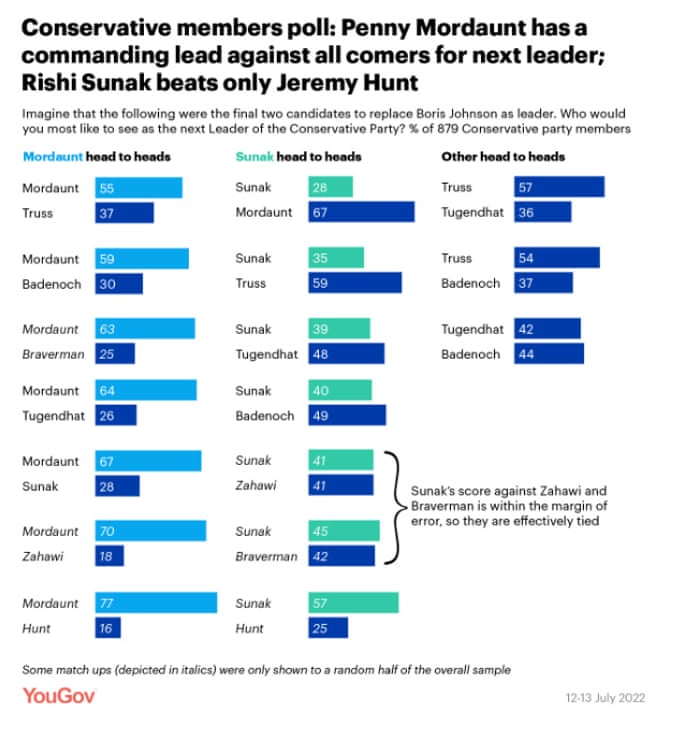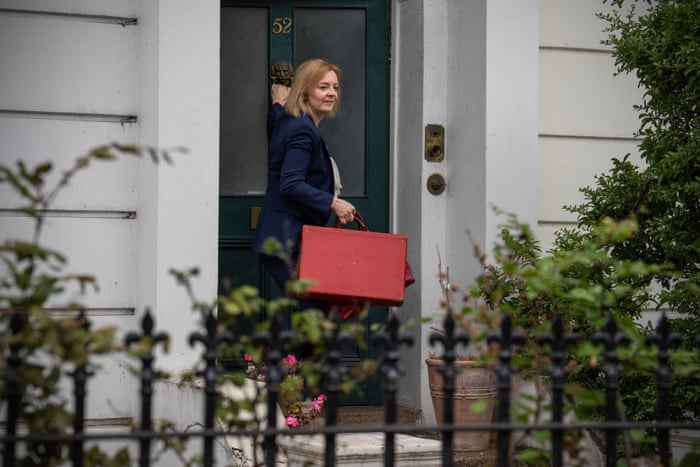Mordaunt would easily beat all other candidates in final ballot of members, YouGov poll suggests
Penny Mordaunt would beat all other candidates in the Tory leadership contest in the final ballot of member – very easily, a YouGov poll for the Times suggests. Liz Truss, the foreign secretary, would prove the strongest opponent. But Mordaunt, an international trade minister, would beat her by 55% to 37%, the poll suggests. She would beat Rishi Sunak, the former chancellor, by 67% to 28%, the poll suggests.

The figures are based on a poll of a weighted sample of 876 members.
The findings are similar to the results of a survey of about 950 Conservative party members published by the ConservativeHome website yesterday. That also found Mordaunt on course to beat all rivals, and some of the ConHome results match the YouGov ones reasonably closely. ConHome has Mordaunt beating Truss by 51% to 33%, and beating Sunak by 58% to 31%.
The main difference is that the ConHome survey implied Kemi Badenoch is the candidate with the best chance of beating Mordaunt. It had Mordaunt beating her by just 46% to 40%. YouGov has Mordaunt winning that contest by 59% to 30%. But the ConHome survey is not weighted, and many of its respondents are presumably readers of the website, which was given Badenoch some particularly good positive coverage recently.
The ConHome results attracted less attention than they otherwise might have done because they coincided with an Opinium poll of party members suggesting Sunak would beat Truss and Mordaunt on the final ballot for members.
But the Opinium fieldwork was carried out between 6 and 8 July. (Its sample was smaller too – 493 people.) YouGov’s fieldwork took place between 12 and 13 July. Given that it is more up to date, and that it coincides with the results of the ConHome survey (which has a good track record in these contests), YouGov is probably the better guide to the state of the contest.
Key events:
In an interview with Katy Balls for the Spectator, Liz Truss, the foreign secretary and Tory leadership candidate, has explained how she would pay for tax cuts. She would repay Covid debt over a longer period, she said:
Covid was a one-off crisis. The debt that we accumulated as a result of that, the £400bn we spent, should be seen as a long-term debt – like a war debt – and needs to be longer-term.
I don’t agree with the Treasury orthodoxy of immediately seeking to pay that back and balance the books and damage economic growth.

Here is an intriguing question from below the line.
Andrew – could the confidence vote be a ruse to trigger an election with him still as PM?
The answer is no. For that to work, Boris Johnson would first have to persuade Tory MPs to vote no confidence in their own government, which they don’t want to do because they don’t want to have an election they would lose. He would then have to persuade the Queen to grant a general election, which might also be tricky because Buckingham Palace would have good grounds for saying no.
But the decision to schedule a no confidence debate, which Johnson will open, on Monday may explain why he sounded very non-committal about turning up for PMQs next Wednesday. (See 1.36pm.) Margaret Thatcher spoke in a no confidence debate just after announcing her resignation and her performance was seen as a triumph. It was the one where she said: “I’m enjoying this,” after Dennis Skinner joked that she should be governor of the European Central Bank and she brought the house down with her reply, “What a good idea.” Maybe Johnson is hoping to be able to pull off something similar.
Here is a clip from the debate.
Voting closes in first ballot for Tory leadership
Voting has now finished in the first ballot for the Tory leadership.
From Alain Tolhurst from Politics Home
Six minutes left for Tory MPs to cast their ballot in the first round of the leadership vote – and according to one team’s teller we are waiting on just 3 people to make their mind up
— Alain Tolhurst (@Alain_Tolhurst) July 13, 2022
From the BBC’s Peter Saull
Pretty much all Conservative MPs have now voted in the first round of the leadership contest. A couple of late stragglers, Alexander Stafford and Scott Benton, made it in with less than 10 minutes to go. A certain Theresa May left it quite late, too.
— Peter Saull (@petesaull) July 13, 2022
From the Sun’s Kate Ferguson
Master of the Dark Arts Gavin Williamson has gone in to vote with just minutes to spare ?
— Kate Ferguson (@kateferguson4) July 13, 2022
UK government to table no-confidence motion in itself
The government is to table a confidence motion in itself after rejecting a version by Labour that directly criticised Boris Johnson, my colleague Jessica Elgot reports.
Jeremy Hunt, the former foreign secretary, accepts he will not go any further in the contest, the Sun’s Kate Ferguson reports.
Hearing that Jeremy Hunt vote has collapsed and that he is privately conceding.
Cannot know this for sure as it’s a secret ballot… but have been told that
— Kate Ferguson (@kateferguson4) July 13, 2022
ITV’s Anushka Asthana says Tory MPs are saying Hunt is unpopular with members. The polling certainly implies this. See 2.27pm for the YouGov figures, and this post at ConservativeHome, where the survey of party members found him to be the most unpopular of all the candidates.
Hearing similar – that there is certainly acceptance in camp he doesn’t ultimately have a chance (tho earlier they thought 30Mps might be poss). One MP said they thought Hunt was most impressive in hustings and meetings, bt said their local members said no way they wd back him 1/ https://t.co/aCbUHH9TZl
— Anushka Asthana (@AnushkaAsthana) July 13, 2022

Tory MPs have been voting in the first round of the leadership contest. According to the Sun’s Kate Ferguson, who is outside the room and counting, most of the party voted within the first hour or so. The ballot closes at 3.30pm.
Apparently 300 Tories have so far voted…
58 to go. They have 54 minutes
— Kate Ferguson (@kateferguson4) July 13, 2022
Mordaunt would easily beat all other candidates in final ballot of members, YouGov poll suggests
Penny Mordaunt would beat all other candidates in the Tory leadership contest in the final ballot of member – very easily, a YouGov poll for the Times suggests. Liz Truss, the foreign secretary, would prove the strongest opponent. But Mordaunt, an international trade minister, would beat her by 55% to 37%, the poll suggests. She would beat Rishi Sunak, the former chancellor, by 67% to 28%, the poll suggests.

The figures are based on a poll of a weighted sample of 876 members.
The findings are similar to the results of a survey of about 950 Conservative party members published by the ConservativeHome website yesterday. That also found Mordaunt on course to beat all rivals, and some of the ConHome results match the YouGov ones reasonably closely. ConHome has Mordaunt beating Truss by 51% to 33%, and beating Sunak by 58% to 31%.
The main difference is that the ConHome survey implied Kemi Badenoch is the candidate with the best chance of beating Mordaunt. It had Mordaunt beating her by just 46% to 40%. YouGov has Mordaunt winning that contest by 59% to 30%. But the ConHome survey is not weighted, and many of its respondents are presumably readers of the website, which was given Badenoch some particularly good positive coverage recently.
The ConHome results attracted less attention than they otherwise might have done because they coincided with an Opinium poll of party members suggesting Sunak would beat Truss and Mordaunt on the final ballot for members.
But the Opinium fieldwork was carried out between 6 and 8 July. (Its sample was smaller too – 493 people.) YouGov’s fieldwork took place between 12 and 13 July. Given that it is more up to date, and that it coincides with the results of the ConHome survey (which has a good track record in these contests), YouGov is probably the better guide to the state of the contest.
Only 35% of Britons trust government, below OECD average, ONS says

Patrick Butler
Only a third of the UK population trust the government, according to statistics published this morning by the Office for National Statistics (ONS).
The survey was carried out in March as “Partygate” and high profile scandals involving controversies over government cronyism, rule-breaking, and lies dominated the political headlines.
Levels of trust varied by type of government institution, however: the civil service was trusted by 55% of those surveyed, and local government by over 40%. Political parties were trusted by just 20% of respondents.
Trust was far higher in public services: the NHS recorded 80% trust levels, followed by the courts and legal system (68%). Police and education each scored over 60%. High levels of trust were associated with high levels of satisfaction with services.
The ONS survey was carried out as part of a wider study involving OECD countries. This showed UK government trust levels of 35% (around 50% said they did not trust the government) were slightly below the OECD average of 41%.
Polled on political participation, 57% of ONS respondents said they had signed a petition, 56% said they had voted in the last local election, and 27% had boycotted certain products for political reasons. Just 18% said they had posted or forwarded political content on social media
PMQs – snap verdict
That wasn’t meant to be Boris Johnson’s last PMQs. But it sounded as if, mentally, he has already checked out, and as if he has other plans for 12pm next Wednesday. That was one implication of his final answer to Keir Stamer, where he said:
The next leader of my party may be elected by acclamation, so it is possible this will be our last confrontation, it is possible.
So, I want to thank him for the style in which he conducted himself. I think it would be fair to say he has been considerably less lethal than many other members of this house.
It is perfectly true that I leave not at a time of my choosing, it is absolutely true, but I am proud of the fantastic teamwork that has been involved in all of those projects both nationally and internationally, and I am also proud of the leadership that I have given.
I will be leaving with my head held high.
No 10 are saying that Johnson does intend to do PMQs next week. But this did sound very valedictory, and it is possible, of course, that the No 10 press office has not yet been told about the trip to Ukraine, or the mystery bout of Covid, or some other hypothetical that might stop Johnson being PM next Wednesday.
Both of those sound more probable than the scenario mentioned by Johnson as a possible reason for another PM being in place next week – a decision by Tory MPs to elect a new leader by acclamation, bypassing the need for a vote of party members. There is precedent for this; it is what happened when Andrea Leadsom made the final shortlist of two and subsequently pulled out, leaving Theresa May elected party leader without a membership ballot. But Conservative HQ wants the members to have a say (May’s premiership arguably suffered because she had not acquired a personal mandate), and leadership candidates have had to promise that they won’t do a Leadsom as a condition for being allowed to take part. So what on earth was Johnson on about?
Sky’s Beth Rigby has wondered if this all part of strong-arming Liz Truss into No 10. But that would involve her getting onto the final ballot (likely, but not inevitable), and the other candidate (Rishi Sunak?) pulling out (very, very unlikely).
PM just made arresting statement. Said this might be his last PMQs should successor be chosen “by acclamation” early next wk
1/ Brady said ’22 sought assurances that no-one wld be anointed/members wld get choice of 2
2/ PM pointing to personal desire to torpedo Truss to No 10?— Beth Rigby (@BethRigby) July 13, 2022
If that was Johnson’s final PMQs, it was bereft of anything solemn or deep. (Tony Blair produced the best PMQs departure quotes in modern times.) But Johnson was astonishingly upbeat and chipper, all things considering. It wasn’t a performance to persuade Tory MPs that they might have made a mistake, but it was a testament to his resilience. Keir Starmer had plenty of good jibes about the Tory leadership candidates, but today they just bounced off.
Sir Lindsay Hoyle, the Speaker, calls for the two Alba MPs thrown out of the chamber earlier to be suspended from the house. (See 12.05pm.) The motion is passed quickly and without opposition. That means they are expelled from parliament for the day.
Sam Tarry (Lab) asks about the murder of Zara Aleena. And there has been another attack on a woman in Ilford, he says. What is the government doing to end the epidemic of violence against women and girls?
Johnson says knife crime is a scourge. Allowing more stop and search would help, he says. And he says tackling rape is important to all MPs. The government has invested in measures to help keep women safe, he says.
PMQs is now over.
Catherine Haddon from the Institute for Government thinktank has got a plausible explanation for why Johnson earlier implied this might be his last PMQs. (See 12.20pm.)
It could simply be he is planning various trips which, very unfortunately I am sure he feels, clash with PMQs. https://t.co/nitf95ZdbO
— Dr Catherine Haddon (@cath_haddon) July 13, 2022
It would not be at all surprising if Johnson were to decide to spend next Wednesday in Kyiv.
Rishi Sunak’s campaign team has responded with this to Keir Starmer’s implicit attack on him (over non-dom status) at PMQs earlier.
Patricia Gibson (SNP) says Johnson resigned after MPs who had supported him changed their minds. So why shouldn’t the people of Scotland be allowed to change their minds about independence too?
Johnson says he thinks the SNP is deciding what to do about Gibson.
Stewart McDonald (SNP) asks for an inquiry into the Panorama investigation into the killing of Afghans in cold blood by special forces.
Johnson says the government does not comment on special forces. That does not mean it accepts the allegations, he says.
Jack Brereton (Con) thanks the PM for what he has done to level up Stoke-on-Trent.
Johnson says Brereton is right. Stamer knows more about Stoke Newington than Stoke-on-Trent, he says. He says he wants to help people into good jobs. He leaves office with unemployment at 3.8%. When Labour left office, it was 8%, he says.
Jon Trickett (Lab) asks about a constituent who died waiting for hospital treatment. Does the PM accept we are living through an emergency health crisis?
Johnson says the NHS has a record number of people working in it. The key thing is to get patients moving through the system. Delayed discharge is making things very difficult for hospitals. That is why fixing social care is crucial, he says.
